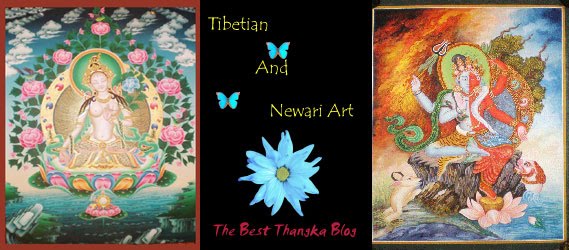In the Tibetan Buddhist pantheon of enlightened beings, Chenrezig is renowned as the embodiment of the compassion of all the Buddhas, the Bodhisattva of Compassion.
Avalokiteshvara is the earthly manifestation of the self born, eternal Buddha, Amitabha. He guards this world in the interval between the historical Sakyamuni Buddha, and the next Buddha of the Future Maitreya.
 |
| Product of Lucky Thanka |
Chenrezig may be the most popular of all Buddhist deities, except for Buddha himself -- he is beloved throughout the Buddhist world. He is known by different names in different lands: as Avalokiteshvara in the ancient Sanskrit language of India, as Kuan-yin in China, as Kannon in Japan.
As Chenrezig, he is considered the patron Bodhisattva of Tibet, and his meditation is practiced in all the great lineages of Tibetan Buddhism. The beloved king Songtsen Gampo was believed to be an emanation of Chenrezig, and some of the most respected meditation masters (lamas), like the Dalai Lamas and Karmapas, who are considered living Buddhas, are also believed to be emanations of Chenrezig.
Whenever we are compassionate, or feel love for anyone, or for an animal or some part of the natural world, we experience a taste of our own natural connection with Chenrezig. Although we may not be as consistently compassionate as some of the great meditation masters, Tibetan Buddhists believe that we all share, in our basic nature, unconditional compassion and wisdom that is no different from what we see in Chenrezig and in these lamas.
We might have trouble believing that we are no different than Chenrezig -- but learning about the nature of compassion, and learning about Chenrezig, repeating his mantra Om Mani Padme Hum and imagining that we would like to be like Chenrezig, pretending that we really are just like Chenrezig, we actually can become aware of increasing compassion in our lives, and ultimately, the lamas tell us, awaken as completely wise and compassionate buddhas.

No comments:
Post a Comment